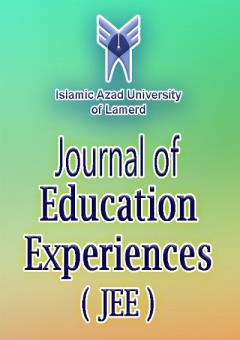Identifying Obstacles to Sustainable Professional Development of Iraqi Teachers and School Administrators in Order to Provide a Model for Overcoming Obstacles
Subject Areas :
Qasem Arzooqi Qasem Al-Zobydi
1
,
Zahra Tavangar Marvasty
2
*
![]() ,
Zeinab Hamzeh Raji
3
,
Zohre Saadatmand
4
,
Zeinab Hamzeh Raji
3
,
Zohre Saadatmand
4
1 - PhD candidate in Educational Administration, Isfahan (Khorasgan) Branch, Islamic Azad University, Isfahan, Iran
2 - Department of Educational Administration, Fasa Branch, Islamic Azad University, Fasa, Iran
3 - College of Education / Ibn Al-Rushd - Department of Educational and Psychological Sciences, University of Baghdad, Baghdad, Iraq.
4 - Associate professor, Department of Educational Sciences, Isfahan (Khorasgan) Branch, Islamic Azad University, Isfahan, Iran.
Keywords: obstacles, professional competency, teachers, Administrators.,
Abstract :
Introduction: This research aimed to identify the obstacles to sustainable professional development of teachers and school administrators in Iraq in order to provide a model for overcoming the obstacles
Methodology: In terms of nature, it is a qualitative research conducted using the content analysis method. Potential participants included teachers, school administrators, and university professors in the fields of educational sciences in Iraq, who were selected purposefully based on a number-based criterion based on the theoretical saturation rule. The data collection tool was a semi-structured interview. The data analysis method was in the style of the Atride and Stirling model.
Findings: The results showed that the obstacles to sustainable professional growth and development in Iraq include: knowledge obstacles (weakness in specialized knowledge, weakness in technology, and weakness in educational content knowledge); The following were the ethical or moral barriers (personal ethics and organizational ethics), the practical or communication barriers (interpersonal communication, organizational communication), the policy-making barriers (strategic weakness and inattention to change), the organizational barriers (weakness of organizational justice, weak supervision, and weak support), and the organizational learning barriers (weakness in knowledge creation participation, weak documentation, and weak knowledge sharing).
Conclusion: Consequently, according to the results of previous research, it can be said that creating strong strategic plans, supporting changes and creativity, paying attention to the individual needs of principals and teachers, and strengthening content knowledge and professional ethics are among the measures that can help strengthen the sustainable professional development of principals and teachers in Iraq.
Eroglu, M., & Donmus Kaya, V. (2021). Professional Development Barriers of Teachers: A Qualitative Research. International Journal of Curriculum and Instruction, 13(2), 1896-1922.
Exarchou, E., Klonari, A., & Lambrinos, N. (2015). Using a Social Web 2.0 tool in geography and environmental research project: A content analysis of Greek high school students’ learning exchanges. Review of International Geographical Education Online, 5(1), 42-55.
Harper R.E. (2008). An Investigation into the Professional Development Needs of Urban Principals and Their Perceptions of the Potential of Online Professional Development. Unpublished PHD thesis.
Isa, M., Neliwati, N., & Hadijaya, Y. (2024). Quality Improvement Management in Teacher Professional
Development. Munaddhomah: Jurnal Manajemen Pendidikan Islam, 5(2), 136-147.
Kuranchie, A., & Bampo, J. (2023). Continuous Professional Development for Public School Teachers: Benefits and Concerns. Journal of African Education, 4(1).
Leh, F. C., Anduroh, A., & Huda, M. (2021). Level of knowledge, skills and attitude of trainee teachers on Web 2.0 applications in teaching geography in Malaysia schools. Heliyon, 7(12), e08568.
Mabele, W. S., Likoko, S. N., & Ongányi, O. P. (2023). FUTURE OF TEACHER PROFESSIONAL DEVELOPMENT IN KENYA: STRATEGIC LEADERSHIP APPROACH. European Journal of Education Studies, 10(1).
Mizambaeva, F. K., & Baimyrzaev, K. M. (2019). Conditions for the formation of professional competence of an intending geography teacher. Revista ESPACIOS, 40(09).
Nkundabakura, P., Nsengimana, T., Uwamariya, E., Nyirahabimana, P., Nkurunziza, J. B., Mukamwambali, C., ... & Ndihokubwayo, K. (2024). Contribution of Continuous Professional Development (CPD) Training Programme on Rwandan Secondary School Mathematics and Science Teachers’ Pedagogical, Technological, and Content knowledge. Education and Information Technologies, 29(4), 4969-4999.
Ramesh P & Krishnan P.(2020). Professional competence of teachers in Indian higher agricultural education. CURRENT SCIENCE, 118(3): 356-361

